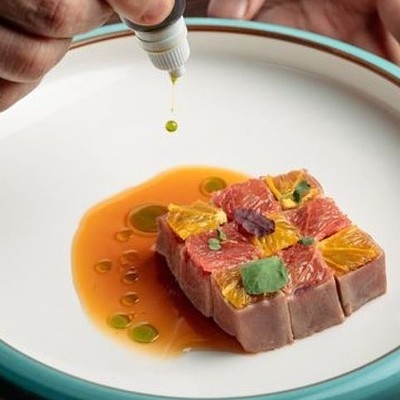"Pétard Blanc," writes La Cruz de Comal owner Lewis Dickson on his winery's Web site, "is a proprietary name and means 'white firecracker' in French. We call it that because of the hallmark natural acidity this wine always has and thus, its explosiveness on the palate."
If you read our recent cover story on the Texas wine industry, "Texas Wines: Behind the Cellar Door," you know that attaining healthy acidity in wine is one of the great challenges that Texas winemakers face.
In the case of criminal defense attorney-turned-winemaker and native Houstonian Lewis Dickson, he is able to deliver acidity-driven white wines thanks to the grape that goes into the bottle -- Blanc du Bois, a hybrid naturally high in acidity developed by Florida University researchers to combat Pierce's disease. As a result, he is able to bottle the wine without employing acidification (or acidulation), a winery crutch employed by all but a handful of Texas winemakers. (See this profile of Dickson: "From Defender of Wily Politicians, Serial Killers and Drug Dealers to Texas Winemaker.")
Over the weekend, we opened a bottle of Dickson's 2011 Pétard Blanc for a visiting Italian winemaker who asked to taste a bottle of Texas-grown wine.
The acidity in this wine was so bright that I wished I had let this bottle age for another year or so before popping the cork. It's one of the hallmarks of the grape variety: "Tongue-splitting" acidity, as my wife Tracie P likes to say. But as soon as I took a bite of the chicken quesadillas we had ordered from a favorite restaurant, the acidity came back into balance (the same way that the acidity in the salsa sang in harmony with the gooey, unctuous cheese and juicy chicken breast).
Right out of the fridge and still too cold, the wine showed intense herbaceous notes reminiscent of Sauvignon Blanc, noted Tracie P. But as the wine began to warm up in our glasses, its floral aromas and stone fruit and citrus flavors began to emerge.
At a certain point, our winemaker friend asked us why Dickson chooses not to filter his wine, leaving the sediment in the bottle (see the photo above). I explained that Lewis is a "Natural winemaker," a term met with disdain by conventional winemakers like our friend. In other words, Dickson tries to manipulate the wine as little as possible in accordance with the tenets of a loosely formed movement of growers and bottlers in Europe and California.
In some circles, sediment in a wine like this would be viewed as an egregious flaw. In other circles (like ours), it's seen as an expression of the grape and its vinification -- an element that Dickson wants to capture in the bottle.
I won't hesitate to reveal that this is my favorite Texas wine (and one that we serve gladly in our home). But is it the "best wine in Texas"?
Frankly, its intense acidity, heavy sediment and high price (around $40 at the winery) make it difficult to call it the "best in Texas": All things considered, the wine breaks too many rules of conventional wisdom and winemaking and its price is not a reflection of the wine's actual value but rather Dickson's costs in making unsulfured wine from grapes grown in a chemical-free environment.
But its freshness and "technicolor" fruit make it stand out from the rest of the crowd, and while it might not win any awards when tasted side by side with the accepted benchmarks of wine today, it's an honest, wholesome wine that speaks to our palate and to our interests. As one Natural winemaker said to me last week in Los Angeles, "I don't put anything into my wine that would kill my daughter if she ate it." As parents of a six-month-old baby girl, this approach to winemaking appeals to us.
Our Italian friend was impressed by this "curious" wine and I'd like to believe he was won over by its story and its genuineness. When he asked me why I collect it despite its hefty price tag, I responded by saying, I know it's only rock 'n' roll, but I like it.
Follow Eating Our Words on Facebook and on Twitter @EatingOurWords






